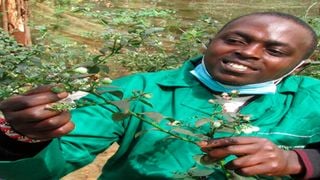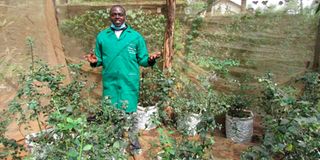
Wilson Ndung’u in his blueberries shade net in Chunga Mali village, Limuru, Kiambu County.
| Sammy Waweru | Nation Media GroupSeeds of Gold
Premium
The berries that keep me off financial blues
What you need to know:
- Since Wilson Ndung’u started farming the fruit, he says demand has kept surging.
- He sells a blueberry seedling from Sh550 – Sh3,000 depending on the size, age and variety.
Inside the shade net on the farm in Chunga Mali, Limuru, in Kiambu County, dozens of plants grown in plastic containers and gunny bags thrive.
A cursory glance tells one that the plants on Wilson Ndung’u’s farm are a variety of flowers, thanks to their yellow petals. But these are blue berries, tiny fruits with big health benefits.
The berries, in fact, are classified as super foods because they are rich in antioxidants, especially anthocyanin, which helps in removing free radicals from the blood, thus, protecting one from diseases like cancer.
Ndung’u grows them in 8 by 15 metres shade net and on this day, Seeds of Gold team finds him dressed in a green overcoat scouting for pests inside the structure.
“Blue berries are exotic but they thrive well locally due to our favourable climate. They are rich in Vitamin C and potassium, among other nutrients. In supermarkets, a kilo goes for up to Sh3,000,” he says.
The fruits, according to him, flourish in a warm environment, that is why he farms them in a shade net.
“I have 45 plants on this farm in Limuru though I farm 100 in total. The others are in Lavington, Nairobi, where I also do seed multiplication under my business Lavington Herbs Farm,” he says, adding the Lavington farm is on a road reserve where he pays the county government for using the space.
He started growing the fruits in 2019, having worked as a fruit supplier since 2012 when he completed high school.
Quality seeds and seedlings
“Then I was supplying fruits that include passion, pepino melons and lemons in supermarkets. One day I saw blue berries in one of the outlets and checked only to find out they were imported. I saw the gap that I could try filling.”
He notes that getting quality seeds and seedlings is key in farming the fruits. “I got my first seedlings from a foreign farmer who had tried growing the crop locally, but failed,” he says, noting it cost him Sh100,000 to start the business.
The seed capital went on buying seedlings, constructing a makeshift shade net, potting the plants and related labour costs.
Ndung’u, who propagates seedlings in the nursery in Lavington, Nairobi, says one can use up to four methods.
“One can sow seeds, which are imported, in a bed and they take a maximum of five years to mature. The other way is by grafting seedlings to end up with a new plant that takes about two years to mature.”
On his farm, he uses air layering method. “Under this I use blue berries stems, which are wrapped with sphagnum moss and nurtured in pots,” he states, adding that once they root, they are transferred to the farm.
Fruits propagated under the method start flowering and fruiting four months after transplanting.
“With air layering, the plantlets do not suffer transplanting shock. Use of sphagnum moss is one of the best ways of retaining moisture in potted plants.”

Wilson Ndung’u in his blueberries shade net in Chunga Mali village, Limuru, Kiambu County.
The last method one can use is through tissue culture propagation. Ndung’u, 28, says he is working closely with the Kenya Agricultural and Livestock Research Organisation (Karlo) in the method.
“I am partnering with Karlo, which is helping in multiplying high quality seedlings. My aim is to get 100,000 seedlings,” says the proprietor of Lavington Herbs Farm.
Vincent Ochieng, a scientist at Karlo, Muguga in Kiambu County, says if correct soil conditions are met, blueberries are easy to grow, require little care and are resilient against pests and diseases.
The expert, however, asks farmers to get seedlings from approved propagators.
“They should source them from Agriculture and Food Authority and Kenya Plant Health Inspectorate Service accredited facilities,” Ochieng advises. “Pests such as aphids, thrips, weevils, beetles, grasshoppers and locusts attack the plants. Diseases are not a serious problem, when one practices integrated management programmes,” he adds.
Ndung’u notes blueberry is a hardy plant as it is rarely affected by pests and diseases.
“If you observe good agricultural practices, the crop will bear fruits all through. Blueberries have a continuous reproduction cycle.”
Price of blueberry seedling
According to Ndung’u, blueberries do well when planted in acidic soils, preferably sand mixed with compost manure.
“They should be planted in pots or containers, and need very acidic soil with a pH of between 4.2 and 5.5. Proper farm management is required, where one must amend the level of acidity, prune, water them regularly and spray when necessary,” he says, noting he grows his fruits organically.
Ndung’u is a full-time farmer. On average, a blueberry plant produces up to 6,000 fruits per year. His target market are local consumers, with a 250g pack going for Sh600.
He markets his produce through social media platforms such as Facebook, Instagram and his company’s website as well as PigiaMe app.
He sells a blueberry seedling from Sh550 – Sh3,000 depending on the size, age and variety.
Mr Ndung’u grows sharp blue and darrow blue berries varieties as well as Brazilian grapes, Nectarine, Lychee and Kaki, though still at pilot stage.
His farm also hosts chamomile, dandelion, lemon verbena, mugwort, rue, tribulus terrestris, hadjod and ajuga remota, herbs that he adds value for sale.
At the outdoor farm in Nairobi , one of his main challenge are birds, which come for the fruits.





